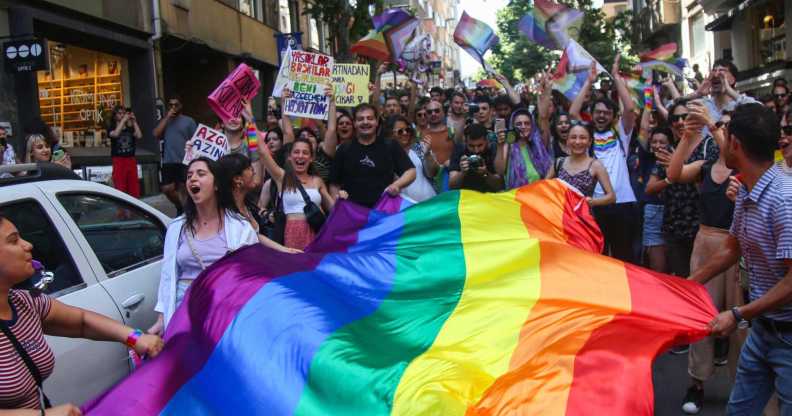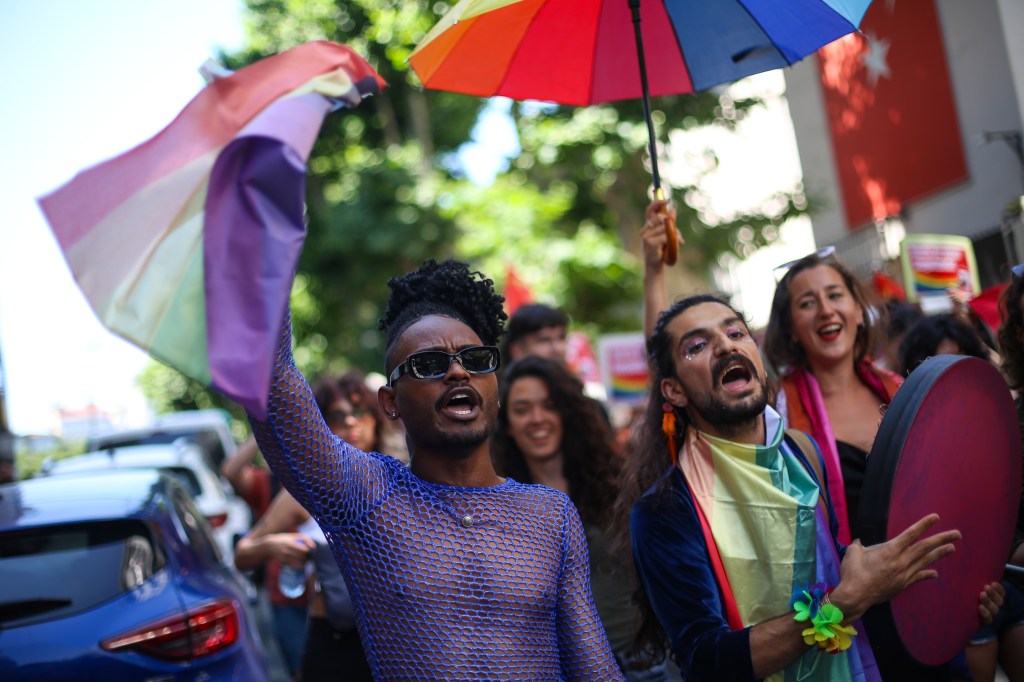Hundreds detained at banned Pride marches in Turkey: ‘They are aware of our strength’

The Istanbul Pride march went ahead despite a ban by the government (Hakan Akgun/ dia images via Getty Images)
More than 100 people were detained by police at banned Pride marches in Turkey at the weekend.
On Sunday (25 June), members of the LGBTQ+ community and allies sought to hold a march in the western coastal city of Izmir, as well as stage the Istanbul Pride March in the country’s capital – which has been banned for the ninth consecutive year.
In a statement on Twitter, Istanbul’s governor Davut Gül described the event as one which would “weaken the family institution”.
Despite the ban, hundreds of people marched in both cities and, in response, local police shut down public transport and blocked access to certain roads.
The demonstrators waved flags, held placards which read “Run Tayyip, run. Queers are coming”, referring to the country’s president, Recep Tayyip Erdoğan, and “Liberation for queers will shake the world”, as well as hanging a giant rainbow flag from a multi-storey car park.
Speaking to Euronews at the event, Istanbul Pride committee member Can Kortun described the police as fearful of those “different” to them.
“They are aware of our strength and numbers. They are aware of the change we can accomplish,” she said. “But despite that, they refuse to communicate, and they are so afraid of us that they don’t let us come out.
“Just now, someone was trying to walk their dogs and they wouldn’t let him. That kind of fear.”
Police arrested 113 people at the march in Istanbul and at least 52 in Izmir, according to reports by Human Rights Watch, figures which expand on those previously reported.
At least one person suffered head injuries during the arrests, according to reports.
Those who were detained in both cities were released a few hours later except for five foreign nationals, whose whereabouts remain unknown.
Hugh Williamson, the director of Europe and Central Asia division at Human Rights Watch, said: “Banning Pride celebrations and detaining people for attempting to march is a flagrant violation of the right to peaceful assembly and expression, and further evidence of the Turkish government’s vitriolic campaign against LGBT people.
“Turkey should stop detaining and prosecuting Pride demonstrators, immediately release the five foreigners detained… and reaffirm their fundamental right to peaceful protest in line with Turkey’s international obligations and its own laws.”
Williamson added: “Both the European Court of Human Rights and Turkey’s own courts have ordered the government to guarantee the right to assembly. Bans on Pride marches and police intervention are nothing more than unlawful intimidation tactics aimed at dissuading people from exercising their right to peaceful assembly.”
The Pride marches come just one month after Turkey’s election which saw the country go to a run-off for the first time, before Erdoğan was handed another five-year term.
LGBTQ+ rights became a key theme of the election, with Erdoğan stating in a pre-campaign speech that the queer community is “poison” before going on to claim that they are the “calamity that threatens the survival of our society”.

At the beginning of the year, the Turkish government proposed altering the country’s constitution to redefine marriage as between one man and one woman, a move which activists fear could result in a slippery slope to criminalisation of same-sex activity.
Nils Muižnieks, Amnesty International’s regional director for Europe, issued a warning before the Pride marches took place, saying: “As thousands take to the streets of Istanbul and Izmir in defiance, they risk facing tear gas and rubber bullets. The authorities should allow LGBTI Pride marches in Turkey to go ahead safely and without interference.
“By ramping up anti-LGBTI rhetoric, the government has helped whip up prejudice, emboldening anti-LGBTI groups [in Turkey], some of which have called for violence against LGBTI communities.
“Under the pretext of protecting family values, the authorities are denying LGBTI people the right to live freely.”
He continued: “The crackdown on Pride events has nothing to do with security or public-order concerns and everything to do with an increasingly anti-LGBTI agenda. Despite the restrictions and ever-shrinking space for LGBTI people in Turkey, and despite the potential for state harassment and intimidation, Pride events will take place.
“Around the world, we offer them our solidarity.”
How did this story make you feel?

